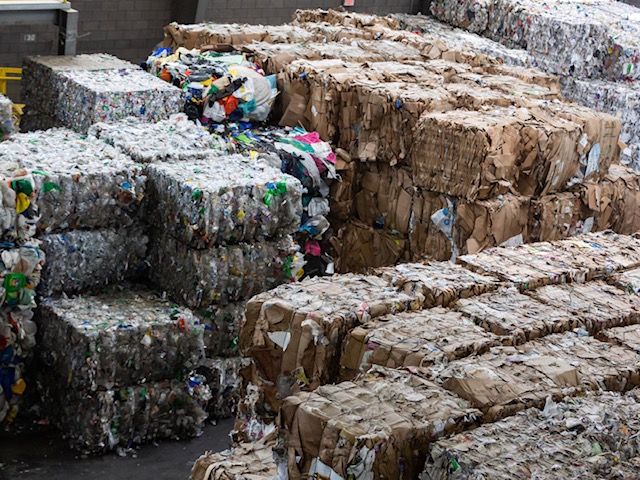Flexible Plastic Packaging Pilot Indicates Recycling Possible in MRFs

[JASON WHALEN | Fauna Creative]
The pilot, the first of its kind in the U.S., was researched and managed by RRS, and conducted at the J.P. Mascaro & Sons TotalRecycle MRF in Birdsboro, Penn. The FPP recovery system and pilot study were funded through a co-investment between leading members of the flexible packaging recovery value chain that includes manufacturers, brand owners, trade associations, and J.P. Mascaro & Sons.
The report, Flexible Packaging Recycling in Material Recovery Facilities Pilot, demonstrates that with adequate optical sorting capacity and peripherals, FPP can be efficiently captured in a large single-stream MRF and processed into a commodity bale, known as rFlex.
FPP includes packaging such as plastic films, wraps, bags, and pouches.
“Approximately 12 billion pounds of FPP are consumed annually in the U.S., and it’s one of the fastest growing consumer packaging formats, but collecting, sorting, recycling and reintroducing this material back into the marketplace as new products requires a comprehensive approach to ensure that these materials don’t end up in landfills,” said Brent Heist, MRFF Steering Committee Co-Chair; Section Head – Packaging Sustainability, P&G.
Based on RRS research, controlled testing, and equipment specification and layout recommendations, the FPP recovery system was successfully integrated into the existing MRF control system at the TotalRecycle facility and achieved the following:
- Captured 74% of FPP in feedstock; currently adjusting equipment/process to move closer to 90% goal.
- Minimized paper in FPP bales to less than 15% by weight.
- Achieve cleaner/higher quality paper bales:
- Reduced FPP from 1.4% to 0.3% in newsprint (ONP),
- Reduced FPP from 1.6% to 0.5% in mixed paper (MP).
- Reduced quality control staff by 38%, redirecting that staff to other areas of the operation.
In addition to testing at the MRF, the pilot featured research into potential end markets for the rFlex bale. An end market workshop was held in early March 2020 to peer review test results and to develop an end market roadmap. Over a dozen end market product opportunities were identify for the rFlex mixed material bale including roof coverboard, subflooring, pallets, sheet stock for signage, rail ties, pavers, decking, and lumber. The first official sale of rFlex bales was confirmed last week for use in the making of building products.
“It’s critically important to find financially viable opportunities and markets for rFlex bales,” said Susan Graff, MRFF research director and RRS vice president. “Our hope is that the pilot research serves as a valuable data set to help other MRFs and communities economically recycle FPP while making cleaner paper bales. By working together to update sorting equipment, municipalities and businesses can support better quality recycling and meet commitments to buy more recycled content products.”
The pilot started with initial research in 2015, moved to controlled testing in 2017, identified J.P. Mascaro & Sons as the pilot MRF in 2018, and entered the pilot phase in 2019 with resident collection beginning in September 2019.
Approximately 56,000 households from municipalities across five Pennsylvania counties that were using standard lidded roll-out recycling carts participated in the pilot.
“It is exciting to be a part of this important research pilot in FPP recycling and see the innovative process be both successfully integrated in our facility and well adopted by our communities,” said Joseph Mascaro Sr., director of recycling and sustainability at J.P. Mascaro and Sons. “We look forward to building off of our current successes to further refine the program and produce an even higher quality commodity bale for recycling into new products.”
Next steps and recommendations identified in the RRS report include:
- Continue to fine tune rFlex bale specifications and quality to meet end market requirements.
- Continued research into rFlex end market product pathways, energy use, and greenhouse gas emissions compared to virgin materials.
- Secure commitments from companies to purchase rFlex products and build more demand for rFlex.
- Co-investment in new build MRFs and capital improvements in existing MRFs.
- More investment to supply large capacity covered residential curbside carts to enable collection of loose materials.
The full report can be downloaded at https://www.materialsrecoveryforthefuture.com/research-results/2020-research-results/.
For more information on MRFF visit www.materialsrecoveryforthefuture.com.
###
Media Contact: Melissa Radiwon, Marketing Director, RRS, mradiwon@recycle.com, 248.444.3456
ABOUT RRS
Founded in 1986 and headquartered in Ann Arbor, Michigan, RRS is a sustainability and recycling consulting firm that strives to create a world where resources are managed to maximize economic and social benefit while minimizing environmental harm. The firm has industry professionals, engineers, economists, technical analysts, and communication specialists who share this vision and possess core strengths in materials and recovery, life cycle management, applied sustainable design, and collaborative action development. www.recycle.com
